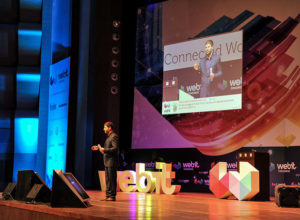Trends in Online Social Behavior
Not only we have various social networks, but there is also a special social behaviour. Web advertisers study online behavior and use the results to increase the effectiveness of their campaigns. One research from the last days says that social media is silencing personal opinion – even in the offline world.
“Some social media creators and supporters have hoped that social media platforms like Facebook and Twitter might produce different enough discussion venues that those with minority views might feel freer to express their opinions, thus broadening public discourse and adding new perspectives to everyday discussion of political issues,” explains the report from Pew Research Center.It turns out that this optimistic desire is not quite the reality. Social media is encouraging users to keep opinions to themselves which is completely opposite to the idea of social media. However, site publishers can use the data generated from website pages and the searches made to create defined audience segments based on visitors that have similar profiles. Combining this data with other demographic and psychographic data helps marketers build their key customer segments. Trends in online social behavior is an everyday-changing topic. The quantity of data is rising daily so analysing customer behaviour gets harder. Book your tickets for Global Webit Congress where you will get many tips and tricks about online social behaviour and its analysis.
Internal Data Science and the Hypercomputing Future
The great majority of scientific research rely heavily on our ability to extract value out of data. Challenging the way we capture, store and process data is fundamental for our ability to fully capitalize on the promise of data.
Currently this “internal” aspect of data science is largely neglected, and receives only little attention or funding in academia or commerce.
At the blue track of the Global Webit Congress, we realize that Big Data, Big Cloud and real time data analytix are trends of the future.
That is why the speakers at the blue track of the Global Webit Congress together with 400 investors, 300 accredited media and thousands of C-level attendees will discuss such hot future topics as:
- Internal Data Science: The mythical art of high performance computing…is it alchemy?
- Brand New Computing: How to increase computational output 1000 times without spending more
- Hypercomputing: What is it and why don’t we have it already?
Norm Johnston and the Interactive Marketing Trends
Technology has fundamentally changed how brands and their audiences communicate. Not just online but across all channels. Interactive marketing is the core of each successful marketing strategy and campaign. When it comes to interactive marketing, the name Norm Johnston says it all.
Norm Johnston has been involved in interactive marketing since graduating from Chicago’s Northwestern University in 1988. While at Accenture, Norm led a team that developed one of the earliest interactive shopping destinations for a large US retail client. After completing his MBA from Duke University in 1995, Norm joined the country's first digital agency, Modem Media, who revolutionized the advertising industry by placing the first banner ad on the internet.
In 1997, Norm moved to London to open Modem's first international office. During his time in London, Modem Media became a leader in the UK digital agency scene, known for nurturing some of the country's best digital talent, consistently placing in the top of the digital league tables, and a winner of numerous international interactive awards on behalf of clients such as Unilever, General Motors, and Citibank. Modem UK was responsible for the country's first rich media ad and viral campaign.
In 2005, Norm led a successful merger between Modem Media and Digitas in the UK. The newly combined agency’s innovative work led the London office in 2006 to being named as one of the world's top 10 most awarded digital agencies and the top winner in the UK. Norm was later part of the management team that sold the agency to Publicis Group, where both Digitas and Publicis Modem continue to thrive today.
Norm joined Mindshare in 2007 as CEO of their Interaction digital specialists group in Europe, Middle East, and Africa. In 2008 Norm was promoted to a broader global responsibility for all digital services as well as a position on the company's global executive board. Norm currently manages over 2 000 digital staff in 115 cities around the world.
He is responsible for leading and expanding all of the agency’s digital capabilities as well as advising Mindshare clients on their digital strategies and plans. Norm is a long-time vocal evangelist of the digital industry and is a frequent speaker at interactive conferences, including various IAB events, the Cannes Advertising Festival, the Festival of Media, Internet World, and AdTech. In addition to Mindshare’s Executive Board, Norm sits on the WPP Digital Advisory Council, the Xaxis Advisory Board, the GroupM Global Digital Executive Committee, Microsoft’s Advertising Advisory Council, and Google’s Agency Advisory Board.
Norm Johnston’s enthusiasm is contagious and you can learn a lot from him. Or just share some experience, if you prefer. Hurry up and book your tickets with early bird prices till the end of August. Few days left!
Mobile Messaging as a platform
Business is constantly looking to provide customers with additional points of interaction with its services. Anywhere, anytime, at any device - this is the mobile messaging. The value of any service is being increased by communication improvements and developments, so the better mobile messaging platform, the more added value to the product. Mobile messaging gives not only access and information, but also satisfaction and confidence to the customers.
Let’s talk with examples, because there are plenty of them. In February, a record acquisition happened. The social giant Facebook acquired the mobile app Whatsapp for 19 billion dollars! The deal is still not officially closed, but this is not important here. More interesting is why Facebook needs Whatsapp and here comes the simple answer - following the trends.
It is Facebook that noticed the trend, but it is not the ‘creator’. Fast-growing Asian mobile messaging networks like Kakao Talk, Line, and WeChat are pretty well-situated on the market. Likewise, Tango - a mobile messaging network (with 200 million users and growing) wanted everyone to know it is serious about publishing mobile games on its platform, so the company invested $25 million in game developers around the world.
It is obvious that the term mobile messaging is versatile. It can be used in any area, industry or business. Totally understandable - Mobile Messaging. Two words that the digital world can not live without. The 6th Global Webit Congress will not miss this actual topic, so hurry up and book your tickets with early bird prices now!
Vote for your favorite startup at the A-Selection of the Founders...
We are now in the hot and challenging second round of the Founders Games of the Global Webit Congress. The A-Selection (Audience Selection) shall skyrocket five startups, among the three hundred Semi Finalists.
The chosen startups will pitch in front of 400 investors, 300 accredited media and thousands of C-level attendees. These are 10 000 potential investors, sponsors, partners and clients from 110 countries participating at the Global Webit Congress.
Here are the top six startups from United Arab Emirates, Morocco, Romania, Israel, Serbia and Egypt that are receiving tremendous support online.
 Do you have a favorite startup that you would like to support by voting for it? Here is your chance to support your favorite startup to be a finalist at the Founders Games.
Look at all the fantastic startups that have made it to the Founder Games A-selection, Select and cast your VOTE now!
Do you have a favorite startup that you would like to support by voting for it? Here is your chance to support your favorite startup to be a finalist at the Founders Games.
Look at all the fantastic startups that have made it to the Founder Games A-selection, Select and cast your VOTE now!
 Do you have a favorite startup that you would like to support by voting for it? Here is your chance to support your favorite startup to be a finalist at the Founders Games.
Look at all the fantastic startups that have made it to the Founder Games A-selection, Select and cast your VOTE now!
Do you have a favorite startup that you would like to support by voting for it? Here is your chance to support your favorite startup to be a finalist at the Founders Games.
Look at all the fantastic startups that have made it to the Founder Games A-selection, Select and cast your VOTE now! It’s about metrix
When it comes to digital, metrix is one the most discussed topics. It will be discussed in October at the Global Webit Congress. It is our pleasure to present Caroline Henne.
Caroline Henne has over ten years of digital and market research experience. She was previously responsible for opening the first international nurago office in London – a 100% subsidiary of GfK which laid the foundations for GfK’s Digital Market Intelligence expansion. Then she joined the International Client Services team and successfully launched GfK’s digital strategy into multiple markets across South and West Europe.
Caroline Henne holds a Bachelor of International Management for Media and is a regular speaker at events across the globe, be it IAB Conferences or other digital, marketing, market research or related events.
Caroline is regularly speaking at external as well as internal digital / marketing / retail / e-commerce / social media conferences & other events across the globe, including recent engagements at Webit CEE Digital Summit, various IAB events in Poland, Romania & further CEE countries, Big Data Reform South Africa, AdTech London and many more.
‘Caroline is a very knowledgeable and competent conference speaker. Her presentations are always relevant and to the point. Her charisma and sense of humour are just a bonus.’ says Gabrijela Stjepanovic, Digital and interactive marketing professional. Meet Caroline at the 6th Global Webit Congress and feel her competence and charm. Book your tickets with early bird price till the end of August.
Social Data for Content Creation
If done properly, content creation requires from you to commit time, energy, and resources. A Pew survey described content creation as the creation of "the material people contribute to the online world." It is pretty clear that in this digital era we are surrounded by infinite quantity of content so in order to survive on any market, you should create content. You should be creative, to care about your customers and to invest lots of energy.
One of the most powerful tools we can use today for content creation is the social media and all of the data it has. Facebook, Google+, Instagram and so on - all of these are full of data. Here comes the question about data analysis, because in order to create content you should find a way to manage the data. Social data analysis is a style of analysis in which people work in a social, collaborative context to make sense of data.
According to Mashable research, when you run a Google search, you should think about the fact that it's just one of 2 million that Google will receive in that minute. In the same amount of time, Facebook users post 684 478 pieces of content. Crazier still, online shoppers spend an average of $272,070 every minute. That's over $391 million every day — quite the chunk of change.
Many social data analysis experts will be at the 6th edition of Global Webit Congress. Since here is not just one simple decision how to analyze data, everything starts with the properly set goals. Book your tickets with early bird prices till the end of August, meet with lots of C-level managers and find your decision.
The Future of Cloud Computing and Big Data in Healthcare
In a fast changing connected world, healthcare as we know it is changing fast. Our everyday life styles and health habits are changing also thanks to the new possibilities offered by technological advances in Big Data and Cloud Computing.
Together with Tech leaders, influential Founders, CTOs, CIOs of the world’s most innovative companies, disruptive start ups, top talents, and over 400 investors and 300 accredited media we will discuss these Future trends in healthcare at the blue track of the Global Webit Congress.
Cloud Computing and Healthcare
In a widely connected Internet of Things (IoT) world, that is becoming predominantly mobile, the current trend is to collect and store information in the Cloud. Cloud Computing allows fast access to the stored data in real time from anywhere. Businesses are increasingly moving toward cloud software services that cost less and are easier to manage. In Healthcare, digital records are stored and managed in the cloud. Healthcare indicators like heart rate, blood pressure, glucose levels are collected and sent to the cloud via wearable devices. Physicians are uploading information about their patients and sharing it with their colleagues. The critical information uploaded in the cloud is analyzed for better outcomes and access of the data. Companies like Salesforce, SAP SE, IBM and Oracle Corp among others, are investing in software and solutions targeted at specific sectors such as healthcare to boost growth.
Big Data and Healthcare
All this Big Data accumulated in the cloud can improve patient outcomes. Using new technologies Big Data is processed and analyzed to identify new trends and solutions that would otherwise be invisible or hard to track. Hospitals can now identify in real time the occurrence of patients with a highly contagious illness. Physicians can examine the information gathered from a patient and identify trends in treatment using data from a pool of other patients stored in the cloud again in real time. Using a desktop PC or an iPad, Android or Windows mobile device they can get to and manage this data from anywhere. Previously undiscovered negative drug interactions could be identified almost immediately using big data. The future possibilities of analyzing and making useful Big Data in healthcare are promising.
Combining Cloud Computing and Big Data will lead to fantastic increases in efficiency and improved patient outcomes.
At the blue track of the Global Webit Congress, we will be discussing the interconnection of Big Data, Cloud Computing and Health Care.
Join in the discussion by applying for an early bird ticket
The Future of Digital Education and Free Online Courses
With the boom of mobile communications and the spread of the Internet of Things (IoT) and wearables, there is increased demand by employers for skilled IT professionals in web and app design. The Future of Digital Education and Free Online Courses is a hot topic of the blue track at the Global Webit Congress.
According to the European Commission (EC), there will be 900 000 unfilled information communication technology (ICT) jobs in the EU in 2020? To battle this widening gap the EC thinks that open online education is the solution. Education is related to employment and good education will foster the skills of the participants and increase their chances for employment.
Free online courses like the ones offered by Coursera in web and app design, Android and iOS will allow IT professionals to learn new skills and fulfill the huge demand by employers for qualified IT professionals.
What are the future trends in education and employment? Can online courses substitute university education? Can traditional university credentials be acquired online? What are the future trends in Digital Education and Online Courses?
The future of Digital Education and Health is a hot topic at the blue track of the Global Webit Congress.
Tech leaders, influential Founders, CTOs, CIOs of the world’s most innovative companies, disruptive start ups, top talents, and over 400 investors and 300 accredited media will be at the Global Webit Conference.
You can also join in the discussion by applying for an early bird ticket now!








